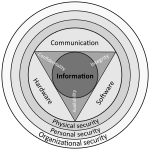Microsoft Security Development Lifecycle
(Redirected from Security Development Lifecycle)
The Microsoft Security Development Lifecycle is a software development process used and proposed by Microsoft to reduce software maintenance costs and increase reliability of software concerning software security related bugs. It is based on the classical spiral model.
Versions[edit]
| Version | Release date | Link |
|---|---|---|
| 1 | January 2004 | Unreleased |
| 2 | July 2004 | Unreleased |
| 2.1 | January 2005 | Unreleased |
| 2.2 | July 2005 | Unreleased |
| 3 | January 2006 | Unreleased |
| 3.2 | 2008-04-15 | http://www.microsoft.com/download/en/details.aspx?displaylang=en&id=24308 |
| 4.1 | 2009-06-01 | http://www.microsoft.com/download/en/details.aspx?displaylang=en&id=15526 |
| 4.1a | 2010-04-15 | http://www.microsoft.com/download/en/details.aspx?displaylang=en&id=17701 |
| 5 | 2010-05-11 | http://www.microsoft.com/download/en/details.aspx?displaylang=en&id=12285 |
| 5.2 | 2012-05-23 | http://www.microsoft.com/en-us/download/details.aspx?id=29884 |
See also[edit]
Further reading[edit]
- Howard, Michael; Lipner, Steve (June 2006). The Security Development Lifecycle: SDL: A Process for Developing Demonstrably More Secure Software. Microsoft Press. ISBN 0735622140.
- Howard, Michael; Lipner, Steve (March 2005). "The Trustworthy Computing Security Development Lifecycle". Microsoft Corporation. Retrieved 31 August 2011.
- Maurya, Hari (14 January 2010). "Microsoft Security Development Life Cycle - short review". TechSurface. Retrieved 31 August 2011.
External links[edit]

